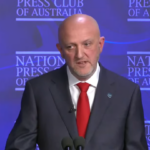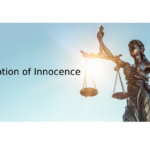The Death of Australia’s Liberal Democracy

Many of us recently awoke to news of another terrorist attack – this time in Lahore, Pakistan.
It was one of many attacks to shake the world in recent months, including bombings in Istanbul in October and the Brussels attack last month. The combined death toll is well over one hundred.
In Australia, we watch with unease. Our nation, and indeed much of the world, watched in horror as the events of the Lindt Café Siege unfolded in December 2014.
Despite the threat of terrorism, Australia has been relatively fortunate to date – the death toll for domestic “acts of terrorism” is seven or eight over the past century, depending on the definition of terrorism applied. This is perhaps partly due to our geographical isolation and that we are not considered a primary target.
Other nations have suffered far greater losses, and governments around the world are taking unprecedented measures ostensibly aimed at preventing further attacks.
In Australia, many see the curtailment of civil liberties as an unfortunate but necessary measure in the present climate.
Human Rights in Australia
Although Australia is considered a liberal democracy, few of our legal safeguards and protections are guaranteed, and we have experienced a significant shift towards state control.
There are only five rights explicitly guaranteed by our constitution:
- the right to vote (Section 41),
- protection against acquisition of property on unjust terms (Section 51 (xxxi)),
- the right to a trial by jury for criminal cases in the higher courts (Section 80),
- freedom of religion (Section 116), and
- prohibition of discrimination on the basis of State of residency (Section 117).
The High Court has additionally found that freedom of political communication is implied by the constitution.
Other basic liberties and protections – like the presumption of innocence, free speech and freedom from arbitrary arrest and detention – have been developed through common law (judge-made law) and the passage of legislation; and can be quickly taken away by the parliament of the day.
Our International Reputation
Australia’s reputation as a free and accepting society has been tarnished by the wholesale encroachment on legal protections and safeguards by our federal and state governments in recent years, and by our treatment of minority groups such as indigenous people, Muslims and asylum seekers.
Despite the firmly established principle that people seeking asylum who arrive without a valid visa are not entering illegally, the government and media have increasingly demonised those who are escaping civil wars and persecution to pursue a better life for themselves and their families.
Speaking Out Against the State
There are also concerns about the loss of our ability to freely speak against government and police operations.
For instance, the Federal government has passed laws to prevent people from speaking out or publishing about human rights abuses in detention centres, offshore boat operations (making it look like the government has ‘stopped the boats’) and ‘special intelligence operations’ (ie anti-terrorism raids, even where innocent people are subjected to horrendous treatment).
More recently, the NSW State government has passed laws to give police the power to ban individuals from attending protests without having to seek a court order, and to ‘move on’ or arrest people at protests, sending them to court to face maximum sentences of 7 years imprisonment.
State Control Likely to Increase
Given the lack of opposition to the wholesale removal of our freedoms, there is little doubt the trend will continue – at least until it starts to become politically unpopular.
The changes are happening regularly and right under our noses – Chief Justice of the Supreme Court Tom Bathurst recently counted 397 legislative encroachments on three legal protections alone: the presumption of innocence, the right against self-incrimination and legal professional privilege.
But with a population bombarded by media and government reports about the threat of terrorism, it seems most accept – or even support – the removal of basic safeguards and protections – believing they will only affect ‘bad people’, and seeing them as necessary to protect against evil.
In that environment, we can only expect our liberal democracy to shift further towards state control.






